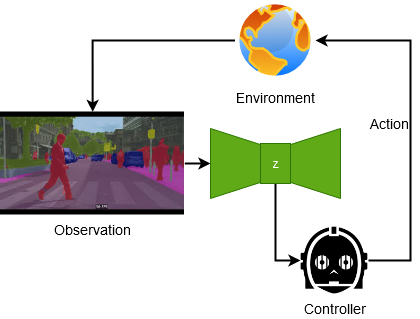Seminar: Robot Learning
Deep learning has become a key enabler of real world autonomous systems. Due to the significant advancement in deep learning, these systems are able to learn various tasks end-to-end, including for perception, state estimation, and control, thereby making important progress in object manipulation, scene understanding, visual recognition, object tracking, and learning-based control, amongst others. In this seminar, we will study a selection of state-of-the-art works that propose deep learning techniques for tackling various challenges in autonomous systems. In particular, we will analyze contributions in architecture design, and techniques selection that also include computer vision, reinforcement learning, imitation learning, and self supervised learning.

Course Information
|
Details:
|
Course Number: 11LE13S-7317-M
Places: 12
Zoom Session Details:
Passcode: 310bBL2Cn
|
|
Course Program:
|
Introduction: 22/10/2021 @ 14:00
How to make a presentation: 21/01/2022 @ 14:00
Block Course: 11/02/2022 @ 09:00
|
|
Evaluation Program:
|
Abstract Due Date: 14/01/2022
Seminar Presentation: 11/02/2022
Summary Due Date: 25/02/2022
|
|
Requirements:
|
Basic knowledge of Deep Learning or Reinforcement Learning
|
|
Remarks:
|
Topics will be assigned for the seminar via a preference voting. If there are more interested students than places, places will be assigned based on priority suggestions of the HisInOne system and motivation (tested by asking for a short summary of the preferred paper). The date of registration is irrelevant. In particular, we want to avoid that students grab a topic and then leave the seminar. Please have a coarse look at all available papers to make an informed decision before you commit.
|
Course Material
|
Recordings:
|
Lecture 1: Introduction - Valid Till: 22/11/2021
|
|
Slides:
|
Lecture 1: Introduction
Lecture 2: How to Make a Good Presentation
|
|
Templates:
|
Additional Information
Enrollment Procedure
- Enroll through HISinOne, the course number is 11LE13S-7317-M.
- The registration period for the seminars are from 18/10/2021 to 25/10/2021.
- Attend the introductory session on 22/10/2021 via Zoom (Session details have been provided above).
- Select three papers from the topic list (see below) and complete this form by 25/10/2021.
- Places will be assigned based on priority suggestions of HISInOne and motivation of the student on 28/10/2021.
Evaluation Details
- Students are expected to write an abstract, prepare a 20-minute long presentation and draft a summary.
- The abstract should not exceed two pages and is due on 14/01/2022
- The seminar will be held as a virtual "Blockseminar" on 11/02/2022
- The slides of your presentation should be discussed with the supervisor two weeks before the Blockseminar.
- The summary should not exceed seven pages (excluding bibliography and images) and is due on 25/02/2022. Significantly longer summaries will not be accepted.
- Ensure you cite all work you use including images and illustrations. Where possible, try to use your own illustrations.
- The final grade is based on the oral presentation, the written abstract, the summary, and participation in the blockseminar.
What should the Summary contain?
The summary should address the following questions:
- What is the paper's main contribution and why is it important?
- How does it relate to other techniques in the literature?
- What are the strengths and weaknesses of the paper?
- What would be some interesting follow-up work? Can you suggest any possible improvements in the proposed methods? Are there any further interesting applications that the authors might have overlooked?
Graded Component Submission
- Save your document as a PDF and directly submit it to your topic supervisor via email.
- The filename should be in the format "FirstName_LastName_X.pdf" where X is the evaluation component (Abstract / Summary / Presentation).
Topics
- Implicit Behavioral Cloning
Supervisor: Eugenio Chisari - Error-Aware Imitation Learning from Teleoperation Data for Mobile Manipulation
Supervisor: Eugenio Chisari - PnPNet: End-to-End Perception and Prediction with Tracking in the Loop
Supervisor: Nikhil Gosala - CertainNet: Sampling-free Uncertainty Estimation for Object Detection
Supervisor: Nikhil Gosala - XIRL: Cross-embodiment Inverse Reinforcement Learning
Supervisor: Daniel Honerkamp - Explore and Control with Adversarial Surprise
Supervisor: Daniel Honerkamp - Weakly Supervised Multi-Object Tracking and Segmentation
Supervisor: Juana Valeria Hurtado - Instance-Aware Predictive Navigation in Multi-Agent Environments
Supervisor: Juana Valeria Hurtado - Quasi-Dense Similarity Learning for Mutiliple object tracking
Supervisor: Rohit Mohan - Rethinking Space-Time Networks with Improved Memory Coverage for Efficient Video Object Segmentation
Supervisor: Rohit Mohan - GTI: Learning to Generalize Across Long-Horizon Tasks from Human Demonstrations
Supervisor: Adrian Röfer - Hierarchical Planning for Long-Horizon Manipulation with Geometric and Symbolic Scene Graphs
Supervisor: Adrian Röfer
Questions?
If you have any questions, please direct them to Adrian Röfer before the topic allotment, and to your supervisor after you have received your topic.

